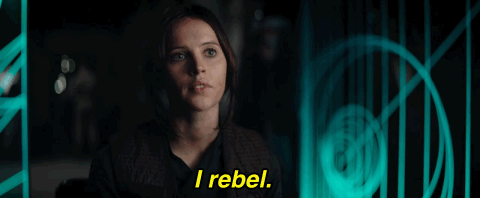After the U.S. election, some of the members of the creative team behind Rogue One: A Star Wars Story spoke out in solidarity “against hate”— and many fans interpreted their message as a political stance against President-elect Trump.
On November 11, 2016, Rogue One writer Chris Weitz tweeted: “Please note that the Empire is a white supremacist (human) organization.” He later deleted that tweet after receiving lots of complaints from other Twitter users, many of whom asked him to stop “injecting politics” into Star Wars. Weitz clarified in one response tweet, “My apologies. You have a right to enjoy it as you wish; and I don’t wish to harm my colleagues’ work either.”
Weitz’ colleague, Gary Whitta, had already written his own response to the tweet comparing the Star Wars Empire to white supremacy, which said: “Opposed by a multicultural group led by brave women.” Whitta’s tweet has also since been deleted.
THR interviewed some market analysts about the Rogue One writers’ deletion of their tweets, and the analysts’ consensus is that Disney probably got worried about their bottom line. Drexel Hamilton analyst Tony Wible put it this way: “With any business, it’s better to leave politics out of a product you’re trying to sell to consumers. You have to separate your product from personal opinions. If you err, social media just becomes an amplifier of the message.”
It’s going to be hard to undo that political messaging at this point, though, since J.J. Abrams was already quite specific about saying that he based the First Order on the Nazis in The Force Awakens. And that’s hardly the first time the comparison has been drawn in Star Wars. George Lucas said that Hitler’s rise to power was one of his inspirations for Palpatine, along with other morally questionable leaders like Caesar and Napoleon.
George Lucas also took inspiration from an American president. In J.W. Rinzler’s The Making of Star Wars: Return of the Jedi, Lucas described another inspiration for Palpatine: “Richard M. Nixon was his name. He subverted the senate and finally took over and became an imperial guy and he was really evil. But he pretended to be a really nice guy.”
Lucas went on to say, “It was really about the Vietnam War, and that was the period where Nixon was trying to run for a [second] term, which got me to thinking historically about how do democracies get turned into dictatorships? Because the democracies aren’t overthrown; they’re given away.”
It would be almost impossible to remove the political aspects of Star Wars at this point, considering that the anti-imperialist and anti-totalitarian messaging has been a part of the story from the start, and arguably has only increased as the series has gone on. The problem is that being against white supremacy is, apparently, becoming a more controversial stance than it used to be. Even noting the parallels between the Empire and white supremacy is, apparently, something that goes too far… even though it’s a stance that is already baked into the original Star Wars movies, games, cartoons, and so on.
It used to be that making a movie that took a hardline stance against Nazis meant that your movie was easily able to become a mainstream hit that didn’t take a particularly controversial stance. If that’s changed… then, I suppose that might affect Rogue One‘s bottom line, but honestly, that’s the least of our concerns.
(via The Hollywood Reporter, image via Giphy)
Want more stories like this? Become a subscriber and support the site!
—The Mary Sue has a strict comment policy that forbids, but is not limited to, personal insults toward anyone, hate speech, and trolling.—
Follow The Mary Sue on Twitter, Facebook, Tumblr, Pinterest, & Google+.









Published: Nov 21, 2016 05:28 pm